On August 6, 2025, the Committee on Foreign Investment in the United States (CFIUS) released the public version of its Annual Report to Congress for Calendar Year 2024 (the Report), which highlights CFIUS’ priorities, enforcement trends, and key indicators of the CFIUS processes and statistics on transactions filed in calendar year 2024. The Report provides valuable information for companies, private equity funds, and investors evaluating foreign investments in US businesses.
This Client Alert presents six takeaways from the Report.
1. Continued decline in overall CFIUS filings
The overall number of filings submitted to CFIUS in calendar year 2024 continued to decline as did foreign direct investment in the United States. In 2024, foreign direct investment decreased approximately 14% from $176 billion (revised) in 2023 to $151 billion in 2024, according to the US Bureau of Economic Analysis. And in 2024, CFIUS reviewed 325 filings, consisting of 209 full notices (down approximately 10% from 233 in 2023) and 116 short-form declarations (up approximately 6% from 109 in 2023). This marks an overall 5% decrease from 342 filings in 2023 and an overall 25% decrease from 440 filings in 2022.
Moreover, the number of distinct transactions filed with CFIUS proves lower still. After adjusting the numbers reported above for 2024 notices that were withdrawn and refiled, declarations that resulted in a full notice, and cases that were carried over from prior years, it appears CFIUS reviewed no more than 269 distinct transactions in 2024.
Based on recently assigned case numbers as of early August 2025, CFIUS filings appear to be on a similar pace with respect to notices (123) and a slightly increased pace with respect to declarations (84).
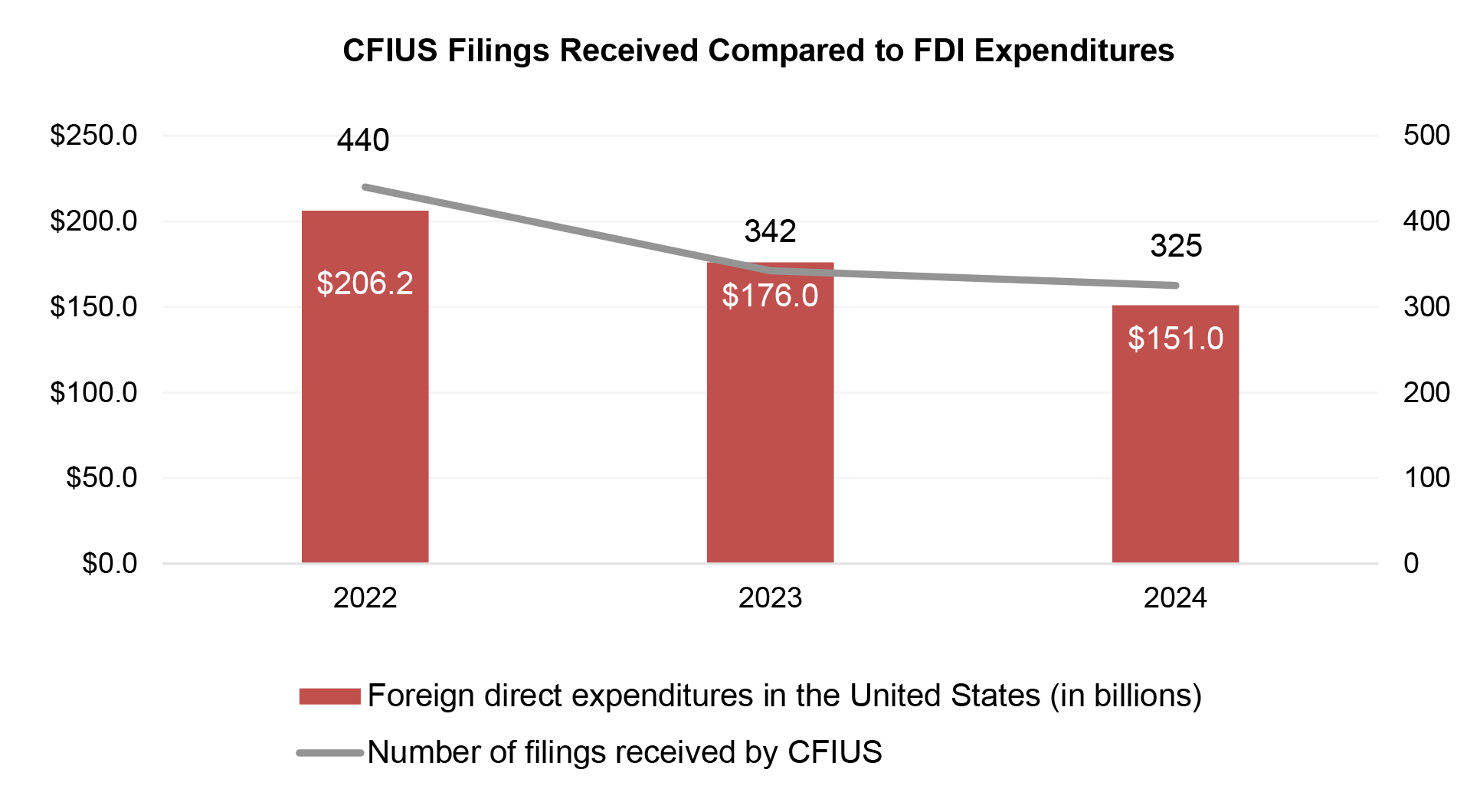
2. Decreased use of mitigation measures and conditions
In 2024, CFIUS required a mitigation agreement to conclude action for 16 notices (8% of notices filed), representing a significant decrease from 2023 (35 cases or 15% of notices filed). CFIUS imposed conditions in letters granting a withdrawal and abandonment of six notices and entered into a mitigation agreement to address residual national security concerns for one abandoned transaction. CFIUS imposed an interim order with respect to one transaction.
The Report reflects that CFIUS is monitoring 242 mitigation agreements and conditions. In 2024, four mitigation agreements and conditions were materially modified, and 25 were terminated. Given the directive in the America First Investment Policy that “mitigation agreements should consist of concrete actions that companies can complete within a specific time, rather than perpetual and expensive compliance obligations,” parties with existing mitigation agreements may consider whether to initiate discussions with the CFIUS monitoring agencies about a pathway to pare back or terminate those agreements.
CFIUS continues to require its standard slate of mitigation measures with one notable addition to the Report: reporting obligations for foreign sales of covered products.
There were two Presidential Orders issued for transactions filed with CFIUS in 2024 (the last such Presidential Order was in 2020). Former President Biden issued one order with respect to a notice voluntarily filed in 2024 and one order with respect to a transaction that was filed with CFIUS after being identified through the CFIUS non-notified process via a public tip.
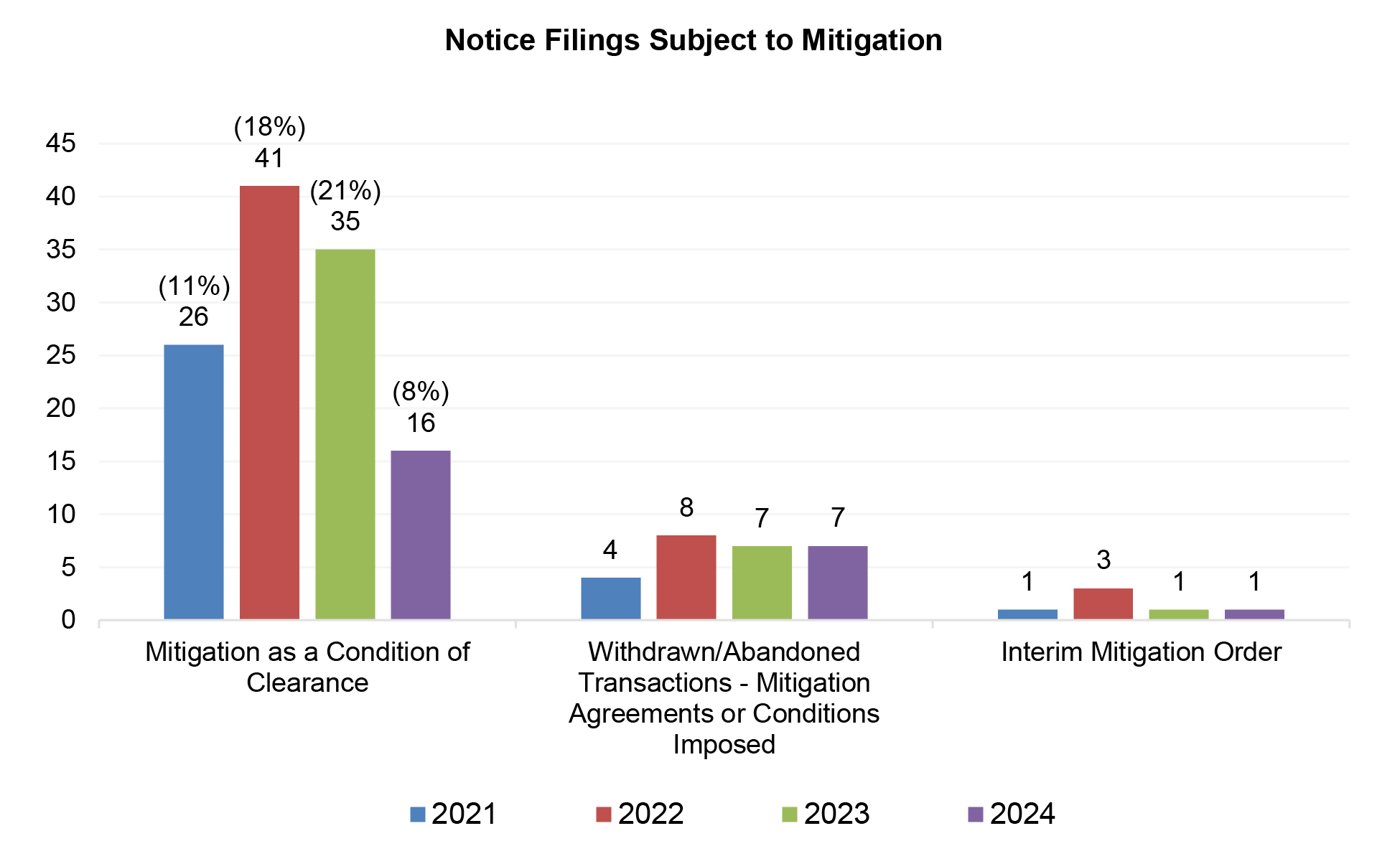
3. Investors from Japan and France made the most filings in 2024 while China filings continued to slide
Investors from or registered in more than 40 countries made filings with CFIUS in 2024.
- Investors from Japan accounted for the highest number of total CFIUS filings, increasing from 26 in 2023 to 40 in 2024 (24 notices and 16 declarations, or an increase of more than 50%).
- There was also a large increase in the number of total CFIUS filings made by investors from France, increasing from 20 total filings in 2023 to 34 in 2024 (a 70% increase).
- Not surprisingly, and continuing a downwards trend, investors from China made the fewest CFIUS filings since 2020, moving from the top spot with 35 filings in 2023 to tying for third with investors from the United Arab Emirates with 28 filings in 2024. Notably, these figures for China may be overstated as CFIUS filings involving investors from China generally take longer, increasing the chance that a single transaction may have been filed multiple times. Also, these numbers for China predate the February 2025 publication of the America First Investment Policy, which may put further downward pressure on filings by China investors in 2025.
As in previous years, the Report did not provide statistics on the outcome of CFIUS filings by country. However, the Report indicated that the highest number of notices in 2023 for distinct transactions were from investors in France, Japan, and the UAE, which indicates that several filings from China represented withdrawn and refiled notices.
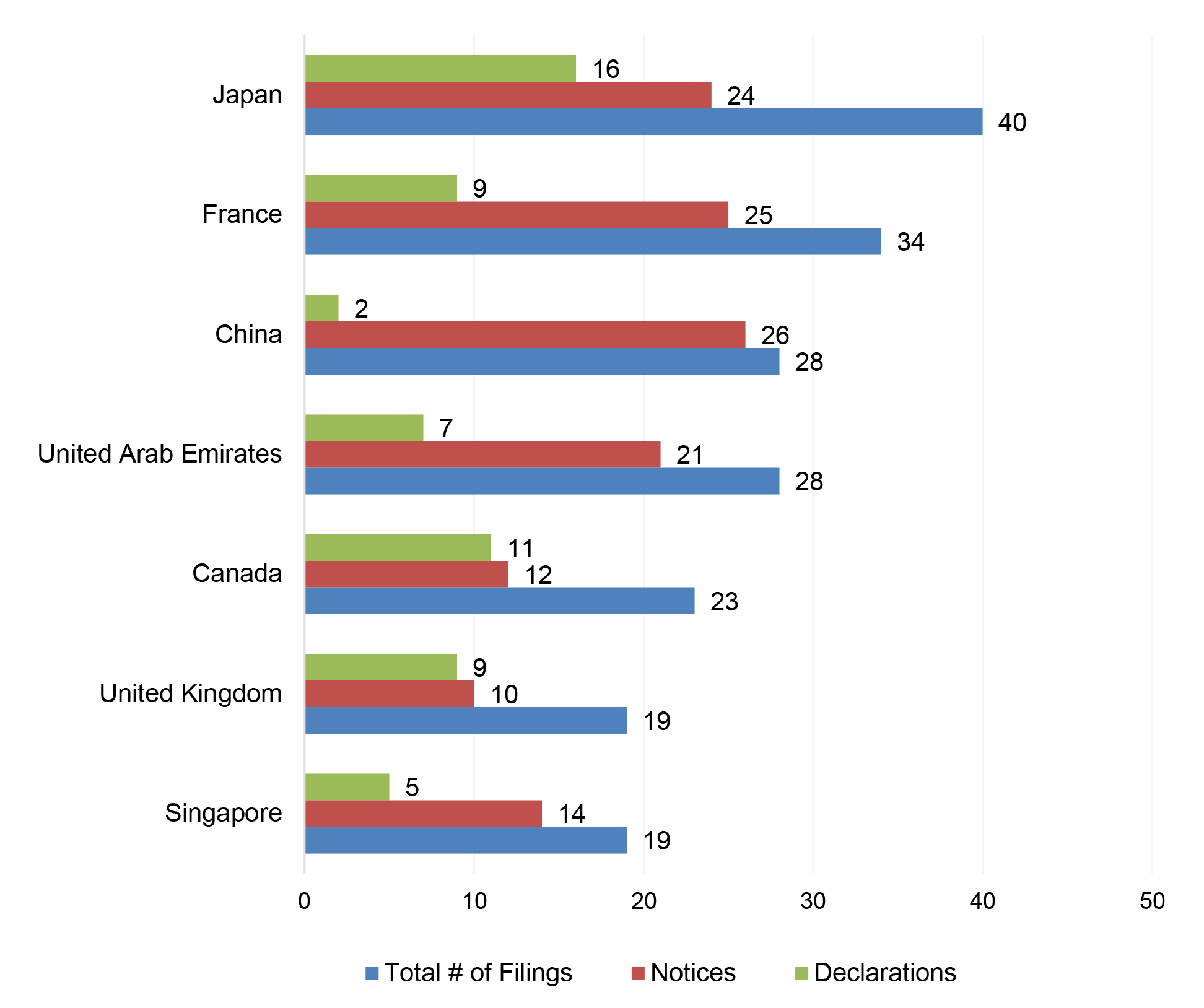
4. CFIUS processing times improved while the number of cases that required a second-stage investigation remained steady
The rate at which CFIUS cleared a transaction based on a declaration reached an all-time high of 78% (91 out of 116 declarations were cleared). This is an increase on top of the previous year’s substantial jump — from 58% in 2022 (90 out of 154) to 76% in 2023 (83 out of 109). The Report also reflects a continued decline in the number of short-form declarations that resulted in a request for a full notice, from 32% in 2022 (50 out of 154) to 18% in 2023 (20 out of 109) to 15% in 2024 (17 of 116). This suggests that the declaration process can be used strategically for the right type of case, as the declaration process is faster, the submission requires less information, and there is no filing fee. While the clearance rate of declarations may reflect the fact that parties are already selectively using the short-form process for transactions that represent a low risk, these statistics reflect that CFIUS is also being efficient with assessing declarations.
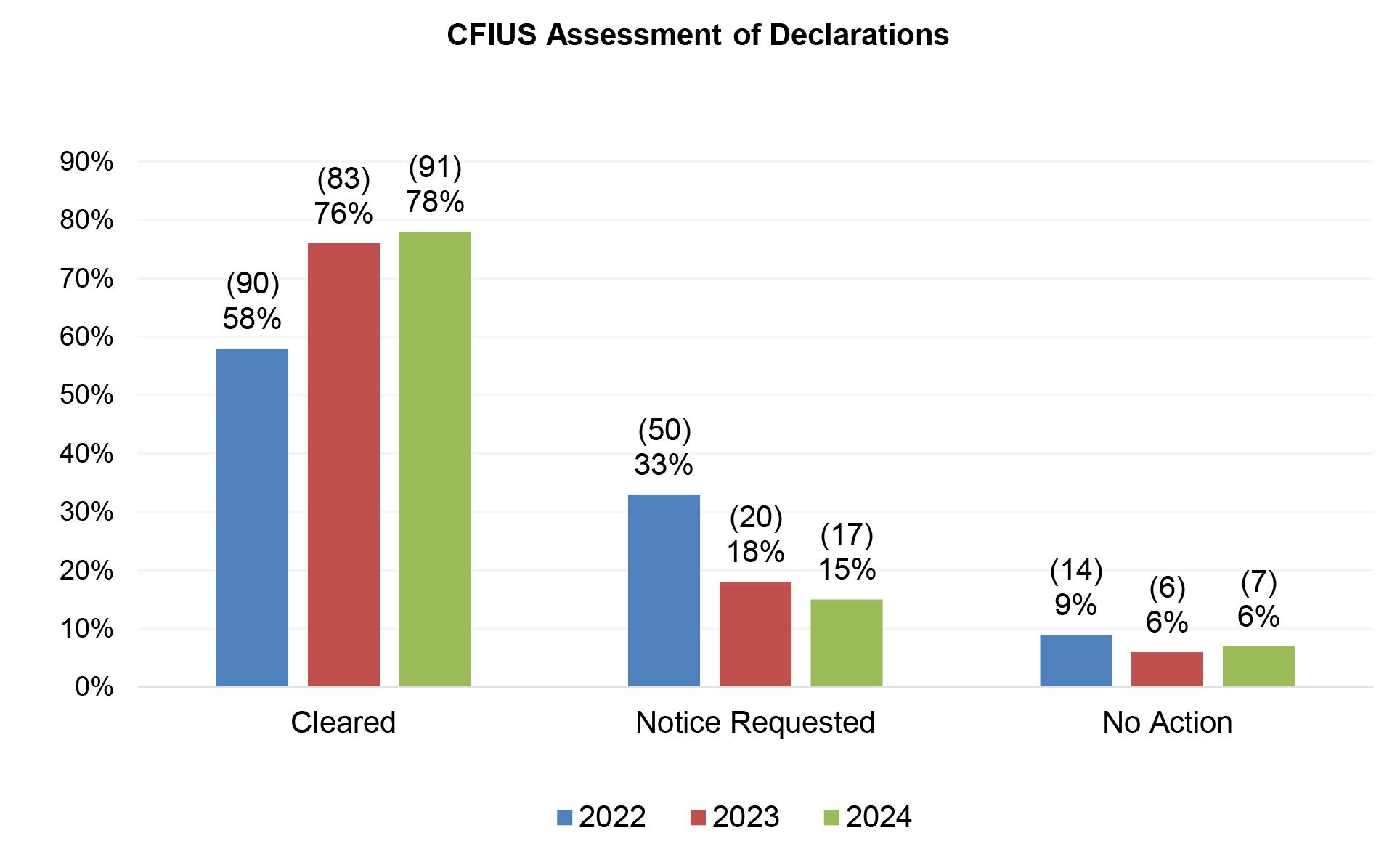
In 2024, the percentage of CFIUS notices that went into a second stage “investigation period” held steady (116 of the 209 notices filed in 2024 or the equivalent of 56%, as compared to 55% in 2023).
In two cases, CFIUS exercised its authority to extend an investigation by 15 days for “extraordinary circumstances.”
The rate at which notices were withdrawn and then refiled (i.e., resetting the statutory clock) remained high. In 2024, 23% of all notices were withdrawn (49 out of 209); parties refiled in 86% of those instances and abandoned the transaction in 14% of withdrawn notices and 3% of all notices (7 cases total). In comparison, in 2023, 24% of all notices were withdrawn (57 notices) and 25% were abandoned (14 cases, comprising 6% of all notices). Parties abandoned four transactions after CFIUS informed them that it was not able to fully mitigate the identified national security risks, in which case parties risk a Presidential Order blocking the transaction if they do not abandon.
The Report notes that, pursuant to President Trump’s America First Investment Policy, CFIUS is reviewing its processes, practices, and authorities “to ensure [it is] positioned to address new and evolving threats that can accompany foreign investment, while maintaining the United States’ strong, open investment environment.” (For more information, see this Latham publication.) How the America First Investment Policy will impact the overall timeline for filings remains to be seen, but one of its stated intentions is to reduce administrative burden and increase efficiency to facilitate investments from allies and partner countries, including through an expedited “fast track” process.
CFIUS also slightly improved the time it took to provide written comments on draft full notices (about seven business days as compared to eight days in 2023). CFIUS also streamlined the time it took to accept a formal written notice (decreasing from five business days in 2023 to about three business days).
5. Non-notified inquiries increased but resulting requests for formal filings decreased
Last year, CFIUS investigated 98 non-notified transactions, ultimately opening 76 non-notified inquiries (a significant increase from 60 in 2023) and formally requesting filings for 12 transactions (approximately 16% compared to 22% in 2023). In five additional cases, parties in receipt of a non-notified inquiry voluntarily filed prior to receiving a formal request.
CFIUS reported using various methods to identify non-notified transactions, including interagency referrals, tips from the public, classified reporting, media reports, congressional notifications, and multiple commercial and proprietary databases. CFIUS also hired additional staff, evaluated new tools and datasets, and coordinated with CFIUS member agencies to strengthen its non-notified process.
6. Monitoring and enforcement trends continue with CFIUS announcing its largest penalty issued to date and the unveiling of its new enforcement webpage
In 2024, CFIUS continued to focus on identifying and assessing penalties both for breaches of material provisions in mitigation agreements and for the submission of a notice and supplemental information containing material misstatements. CFIUS announced its largest penalty issued to date ($60 million) and the most penalties that it issued in a single year to date (five).
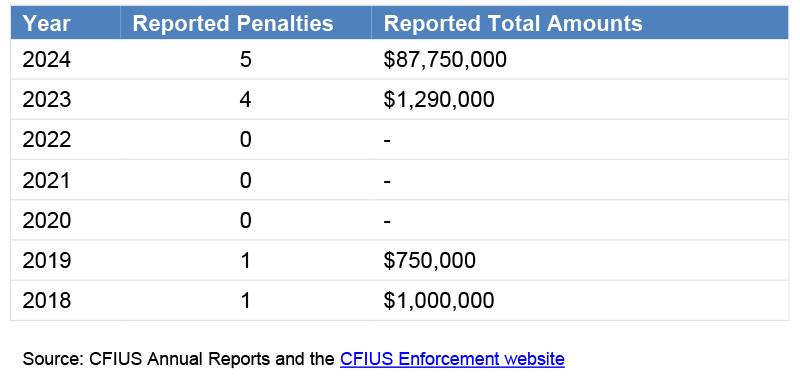
CFIUS unveiled a new enforcement webpage that describes how CFIUS approaches compliance and enforcement and provided an updated list of its enforcement actions. CFIUS also increased site visits in connection with its monitoring of mitigation agreements (from 44 in 2022 and 43 in 2023 to 79 in 2024). This included, among other activities: compliance-focused interviews with senior executives and line-level personnel; inspection of records and systems; and verification of physical and logical access controls.
CFIUS completed two investigations with respect to compliance with its mandatory filing requirements and issued a formal determination of non-compliance in one of them. CFIUS also received an unspecified number of voluntary self-disclosures for other potential failures, which it continues to investigate.